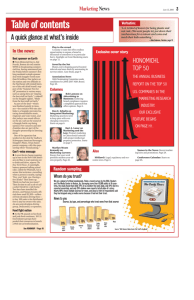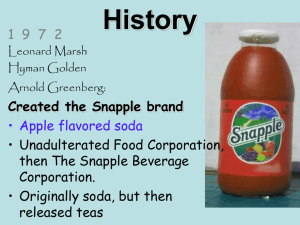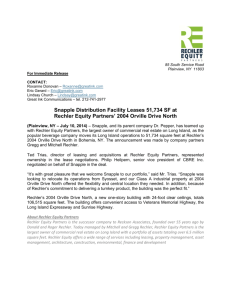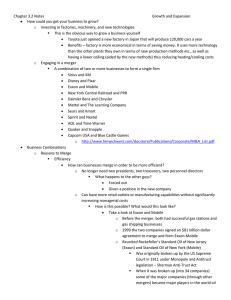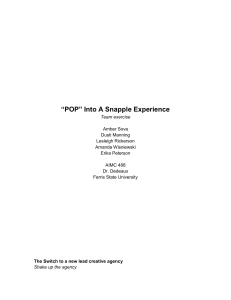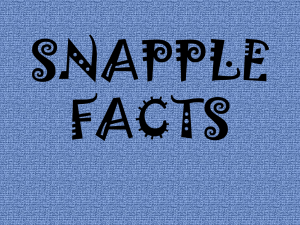1997 : Triarc acquires Snapple
advertisement
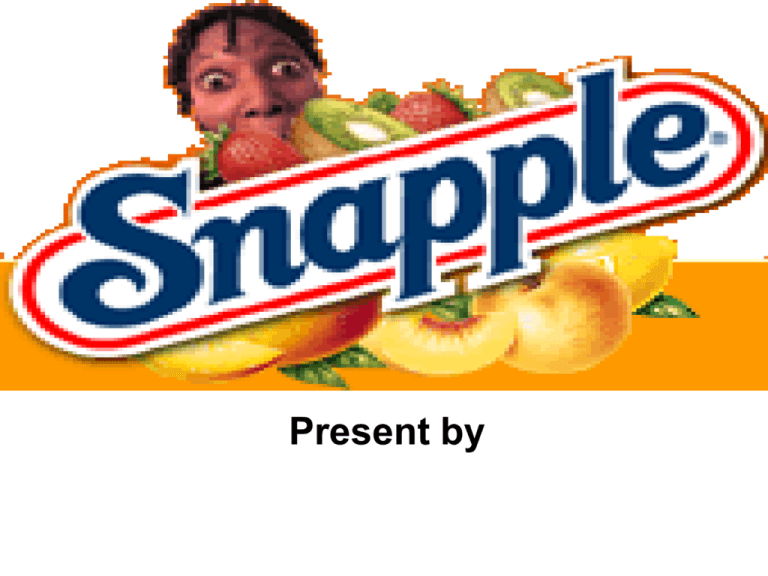
Present by Overview •Introduction •S.W.O.T. Analysis •Problems •Market Segmentation •Positioning •Recommendations Introduction 1972-1986 : The origins of brand 1987-1993 : The glory years 1991: Distribution jumped over to West Coast 1992 : Snapple sold to a Boston private bank 1994-1997 : Quaker takes command 1994 : Quaker buys Snapple for $1.7 billion 1997 : Triarc acquires Snapple 1997 : Triarc buys Snapple for $300 million Annual Sales Revenue, 1972-1997 96 19 92 19 88 19 84 19 80 19 76 Growth of Snapple 19 72 19 $ Millions 800 700 600 500 400 300 200 100 0 Alternative Beverage category, 1997 17% 24% Premium(e.g., Snapple) NonPremium(e.g., Lipton) Bottled Water 16% Sports Drink 24% 100% Juice 19% Total Alternative Beverage Category: $10 Billion at Wholesale Supermarket Brand Shares, 1997 29% 35% 11% 9% 4% Snapple Ocean Spray Nestea Lipton Arizona All Others 12% Total Supermarket Alternative Beverage Category: $3 Billion at Wholesale Snapple Flavors ( %of cases in 1996) (1) Lemon Tea (2) Kiwi Strawberry (3) Mango Madness (4) Peach Tea (5) Pink Lemonade (6) Diet Peach Tea (7) Fruit Punch (8) Raspberry Tea (9) Diet Lemon Tea (10) Diet Raspberry Tea Top 10 of 50 Flavors 15 % 7 5 5 5 4 4 4 3 3 55 % SWOT Analysis Strength: 1. Brand image - natural, quirky, offbeat, playful, personal, authentic 2. Full of variety and flavor - diverse product line - over 50 flavors 3. Brand name - snap; appleimplicit health claims 4. Imaginative use of names - e.g., Mango Madness SWOT Analysis Strength: ( Cont.. ) 5. Adoption - most new drinkers had been aware of Snapple - Snapple drinking flows are through friendship network 6. Packaging - plays out the taste experience - complexity of the label, stippling on bottle SWOT Analysis Weakness: 1. Not an established brand - like a fashion water - differentiation is weak - lacks a compelling reason to use 2. Distribution - Quaker was wrong 3. Usage rate - fluctuates seasonally, diurnally, and cyclically 4. Regional Differences - areas without a postmodern mindset SWOT Analysis Weakness: ( Cont..) 5. Quaker’s corporate image 6. Package size 7. Price SWOT Analysis Opportunities: 1. More variety, imagination, and flavor than competitors 2. The diversity within Snapple Brand - a model for a multicultural society 3. No great competitors - Snapple is fun in a way unduplicated by any other brand of soft drink - no competing brands stand out at the time 4. Health concern 5. Future trend is going to be individualism. SWOT Analysis Threats: 1. Rumor - deep sense of betrayal by customers 2. Distribution - warm or cold? 3. Image - effect of Quaker: fashion lifestyle Problems •Corporate Image •Spokesmodel Disappear •Inappropriate Distribution •Product Size •Lack of Innovation •Pricing Market Segmentation •Geographic: Urban areas in U.S. & foreign countries •Demographic: Right people •Psychologic: Active lifestyle Target Market Right people with active lifestyle! Positioning Nature! Good-for-you! Fashion! Place Promotion Price Product 4P •Product: Smaller bottle, Product and packaging innovation •Place: Cold channel + Warm channel •Promotion: Spokesman •Price: No discount Recommendations •Reestablishing Image - Real - Natural - Good for you •Distribution - Niche Marketing - National - A Network of Distributors - Warehouse Distribution •Price - High Recommendations •Bottle Design - Smaller - Convenient - Ready to drink - Just fits in your hand •Promotion - Advertisement - Sampling •New Products Development - Health - Diet Thank You Very Much! Have A good Night!
